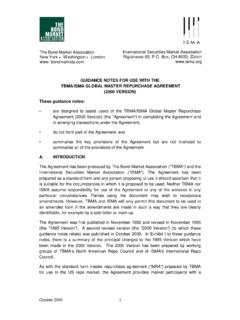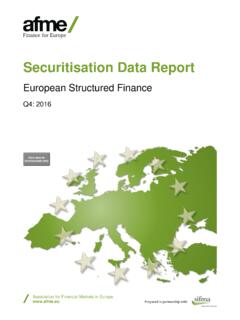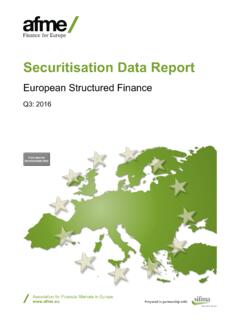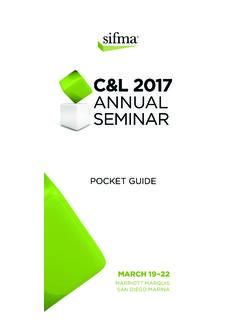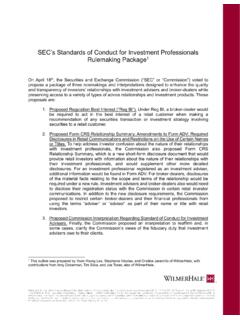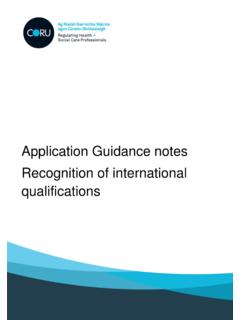Transcription of Guidance Notes to the Amendment to Annex III ...
1 September 2012 Amendment to Annex III ( international transactions ) of 1996 Master Repurchase Agreement Guidance Notes 1 Guidance Notes to the Amendment to Annex III ( international transactions ) of the Master Repurchase Agreement 1996 Version The Securities Industry and Financial Markets Association ( SIFMA ) has prepared an Amendment (the Amendment ) to Annex III ( international transactions ) of the Master Repurchase Agreement (the Agreement ), which would revise Paragraph 5 (Taxes) of Annex III in order to address certain changes to federal income tax law and to market practice affecting the parties withholding tax obligations. The principal changes address potential withholding tax under the Foreign Account Tax Compliance provisions ( FATCA ) enacted in 2010, and potential withholding tax under the tax rules relating to substitute dividends or dividend equivalents.
2 These Guidance Notes should not be relied upon by any party to determine, without appropriate legal, accounting, tax or other relevant professional advice, whether to engage in particular transactions and whether the Agreement or Annex III is suitable to its particular circumstances and needs. Capitalized terms used but not otherwise defined in these Guidance Notes have the meanings given to them in the Agreement and in Annex III. 1. FATCA Background. FATCA generally provides that a withholding agent must withhold 30 percent on withholdable payments, such as interest, dividends, or gross proceeds from instruments on which such payments are made, made to a foreign financial institution ( FFI ) unless the FFI enters into an agreement (an FFI Agreement ) with the Internal Revenue Service ( IRS ) to carry out diligence to determine whether its account holders are specified United States persons or United States foreign owned entities, to report certain information about such account holders to the IRS, and to withhold tax on certain payments to account holders that are not compliant with FATCA, among other matters.
3 FATCA also imposes 30 percent withholding tax on payments to non-financial foreign entities that do not provide information relating to their substantial United States owners. Under proposed regulations, withholding agents would be required to begin withholding tax under FATCA in 2014. The United States and several other governments have announced their intent to explore a common approach to FATCA implementation through domestic reporting and reciprocal automatic exchange and based on existing bilateral tax treaties. FATCA could require a withholding agent to withhold tax on the payment of Price Differential or Repurchase Price, or on payments of amounts equal to Income on Purchased Securities issued by issuers. September 2012 Amendment to Annex III ( international transactions ) of 1996 Master Repurchase Agreement Guidance Notes 2 Changes to Paragraph 5.
4 Subparagraph 5(b)(i) of Annex III generally requires that the Payor of money under an international Transaction will make payments free of Tax except as required by law. If Tax is imposed, Payor generally is required to pay additional amounts to Payee sufficient to ensure that Payee receives the same cash payment it would have received absent the Tax. Payor is not required to pay additional amounts, however, if the tax results from certain connections between the taxing jurisdiction and Payee or to the extent that the Tax results from Payee s failure to comply with certain tax documentation and related obligations. The Amendment revises Subparagraph 5(b)(iv) to include several new exceptions to Payor s obligation to pay additional amounts, which are intended to apply in addition to the existing exceptions.
5 New subparagraph 5(b)(iv)(A)(y) provides that additional amounts are not payable in respect of any federal withholding tax imposed or collected pursuant to FATCA. The term FATCA is defined to refer to the applicable statutory provisions and certain amended or successor provisions, any regulations or other official interpretations thereof, any FFI Agreement, and any fiscal or regulatory rules adopted by a government pursuant to any intergovernmental agreement entered into in connection with the implementation of FATCA. This definition is similar to the corresponding language in the Loan Syndications and Trading Association (LSTA) 2011 model credit agreement provisions. It is intended that the exception in subparagraph 5(b)(iv)(A)(y) of Annex III will apply to any withholding taxes imposed by FATCA, regardless of whether they are collected or required to be collected by a or withholding agent.
6 Subparagraph 5(b)(iv)(A)(y) is not intended, however, to apply to any withholding taxes, regardless of whether the adoption of such laws is related in some way to FATCA. The Amendment expands the tax documentation provisions of subparagraph 5(b)(ii) of Annex III to refer to information as well as certificates and documents because elimination of FATCA withholding tax may require Payee to provide information to Payor, for example the Payee s foreign financial institution employer identification number (FFI EIN). The Amendment makes no changes to Paragraph 6 (Tax Event) of Annex III. Consequently, if the imposition of withholding tax under FATCA has a material adverse effect on a party to an international Transaction, that party may be entitled to terminate the Transaction. 2. Dividend Equivalents Background.
7 Tax law requires that a withholding agent that makes a payment of amounts equal to Income attributable to a dividend on a equity to a person withhold tax at the same rate that would apply as if the payment were the underlying dividend. Since 2010, temporary rules have provided that a similar payment by a non- withholding agent to another person also is subject to withholding tax unless the recipient is a qualified securities lender ( QSL ) and certain other conditions are satisfied. (Different rules applied under prior law.) Other countries also may impose withholding tax on manufactured interest or dividend payments. September 2012 Amendment to Annex III ( international transactions ) of 1996 Master Repurchase Agreement Guidance Notes 3 Changes to Paragraph 5. The Amendment adds new subparagraph 5(b)(iv)(B) of Annex III, which provides that, if Payee is the Seller, Payor is not required to pay additional amounts to the extent that Tax of an equivalent amount would have been withheld on the income on the relevant Purchased Security if it had been retained by Seller.
8 Payor is entitled to rely upon documentation provided, or not provided, by Seller to determine the withholding tax that would have applied to the income on the Purchased Security if it had been retained by Seller. In the case of withholding tax on substitute dividends, the amended provisions are intended to operate in the following manner: Example 1. Assume that a party sells a equity to a counterparty, and Seller would have been subject to a 30 percent withholding tax on the receipt of a $100 dividend on the equity and is not a QSL. Payor (Buyer) would withhold $30 of tax in respect of the substitute dividend payment that it makes and would pay $70 to Seller. Because Seller would have been subject to $30 of withholding tax on the dividend, Payor is not obligated to pay additional amounts to Seller in respect of the $30 withholding tax on the substitute dividend.
9 Example 2. Assume the same facts as Example 1, except that Seller is entitled to a reduced 15 percent rate of withholding tax on the receipt of a $100 dividend on a equity pursuant to a income tax treaty. Seller provides an IRS tax form to Buyer stating that it is a foreign person, but does not claim the benefits of the treaty. Payor (Buyer) would withhold $30 of tax in respect of the substitute dividend payment that it makes because Seller did not provide documentation claiming a reduced rate of withholding tax under a treaty, and would pay $70 to Seller. Payor is not obligated to pay additional amounts to Seller in respect of the $30 withholding tax on the substitute dividend. Example 3. Assume that a party sells a equity to a counterparty, and Seller would have been subject to a 15 percent withholding tax on the receipt of a $100 dividend on the equity.
10 Seller is a QSL and has provided adequate certification of that status to Payor. Payor (Buyer) is obligated to pay $100 in respect of that dividend, and is not required to withhold tax on the substitute dividend because Seller is a QSL. Subparagraph 5(b)(iv)(B) therefore is not relevant to that payment, unless another jurisdiction imposes withholding tax on the substitute dividend payment. 3. Other Changes to Paragraph 5. Indemnity. The Amendment adds new subparagraph 5(b)(v) of Annex III, which provides a contractual indemnity by Payee to Payor in the event that Payor is obligated to withhold Tax on a payment to Payee but fails to do so. If a tax authority seeks to collect the Tax from Payor, and the Tax is one for which Payor is not obligated to pay additional amounts to Payee, Payee is obligated to pay an amount equal to the Tax to Payor.
